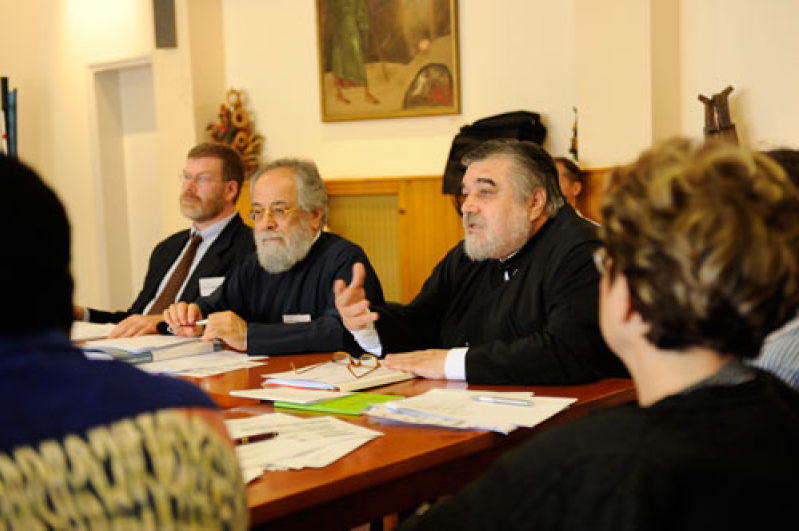
More than 120 theologians from various Christian traditions concluded on Tuesday a meeting in Greece where they discussed ecumenism and the call to be one church.
The weeklong meeting of the World Council of Churches' Faith and Order Commission was considered to be a "landmark in ecumenical dialogue," according to Dr. John Gibaut, director of the commission.
On the opening day of the Oct. 7-13 meeting the Ecumenical Patriarch Bartholomew I, spiritual leader of Orthodox Christians around the world, acknowledged the unity of the Church is a "never-ending search, an ever-unfolding journey." But he added that their ongoing pursuit of unity is "a testimony to the fact that what we seek will occur in God’s time and not our own."
"[U]nity obliges us to a common purpose in this age as we expect the age-to-come; for it commits us to a sacred ministry and mission in realizing that kingdom, as we declare in the Lord’s prayer, 'on earth as in heaven,'" he said.
But what is unity?
Minna Hietamäki, a Lutheran theologian who teaches religion, said unity to her students means "coerced uniformity, the loss of individual identity and the necessity to conform to something alien."
"The question in my mind is not so much, how much diversity can the church's unity tolerate, but how much diversity does the church's unity need," she said.
The differences among faith groups is not only for aesthetic enjoyment, she noted, but the diversity "challenges us reach beyond our comfort zones and to labor with words, tongue, actions and truth to live and speak as a truly Christian community."
The Rev. Marianela de la Paz Cot, an ordained minister in the Episcopal (Anglican) Church of Cuba, reminded the religious figures that the Christian community is a community of people who are not like-minded. Their sense of belonging, rather, arises out of their encounter with Jesus Christ.
"The concept of the people of God should be understood as something that releases us from our rigid positions as the institutional church to send us out on a journey," Paz Cot emphasized.
Noting that they cannot achieve unity only as an internal Christian matter, he called for interreligious dialogue and unity between various religions.
"The Church is called to be one, but cannot understand that call from an exclusive or excluding perspective," the Anglican minister said. "We are the people of God, called to journey together, not to demonize and leave behind others because we consider them 'not one of us.' Revelation is polyphonic."
Already "so wounded and divided," the world does not need religious trenches, but bridges, Paz Cot said.
For over 80 years, the Faith and Order Commission has facilitated theological dialogue on issues that divide churches. It is regarded as the widest Christian theological forum in the world owing to the number of ecclesial traditions involved, the regions represented and the fact that its members are official representatives of their churches. It is made up of WCC member churches – mainly Protestant, Anglican and Orthodox churches – and others, including the Roman Catholic Church.
The goal of the commission is "to proclaim the oneness of the church of Jesus Christ and to call the churches to the goal of visible unity." Pastors, laypersons, scholars or church leaders are nominated by his or her church to contribute the meetings, which are held once every six to eight years.
The Rev. Dr. Olav Fykse Tveit, who was recently elected as WCC's new general secretary, isn't concerned about Christians losing their distinctiveness when committing to interreligious dialogue. He told Christian Today in an interview that considering the many issues they face, he feels it would be "very counterproductive and dangerous if we don’t find ways to work together and to try to give expression to as our common concerns."
"It is not anything against my integrity as a Christian to find ways to work with people of other faiths on these issues – quite on the contrary," he said, noting that working together does not mean agreeing on all theological aspects. "I think we should be courageous Christians in the sense that we know we are called to share the Gospel while also acknowledging that that also means we have to share the Gospel of the love of God and not create conflicts between people that have to live together."
Outgoing WCC General Secretary the Rev. Dr. Samuel Kobia echoed the call to love. He told participants this year that the work of Faith and Order can only achieve consensus when it works in love, otherwise they are merely clever.
"The conversation and agreements reached here will not mend the broken stick; they will not come from an abiding in Christ, the vine and the cornerstone," he said. "They will not advance unity so that the world may believe; no one will know that you are His disciples, if you have not loved one another as Christ loves each of you."







